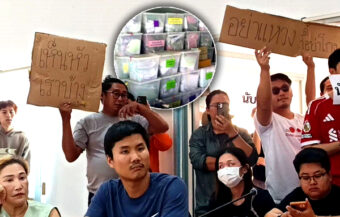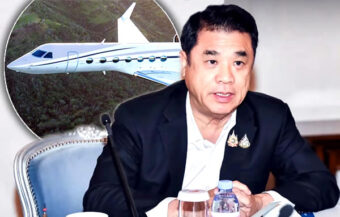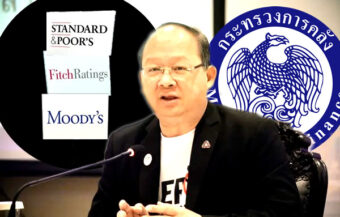Outgoing Bank of Thailand governor’s final MPC meeting on August 13 may cut rates by 25bps to support the economy amid rising US tariffs, weaker tourism and a strong baht. Experts say timely action is crucial to keep GDP growth above 2% despite ongoing challenges.
Wednesday marks the final Monetary Policy Committee meeting under outgoing Governor Sethaput Suthiwartnarueput. Most analysts predict a 25 basis point rate cut as the government scrambles to steady the economy amid mounting headwinds in the year’s last four months. Despite the turmoil dogging the Pheu Thai-led administration, there’s still a shot at pushing Thailand’s GDP growth above 2% this year. That would be a hard-won victory after a relentless streak of setbacks in 2025.

The Bank of Thailand’s Monetary Policy Committee (MPC) is expected by many observers to lower interest rates at its meeting on Wednesday. A 25 basis point reduction from 1.75% to 1.5% is widely predicted. This decision comes as the government works to shore up exports during the last two quarters of the year. It follows a surprising economic performance in the second quarter of 2025, when the economy grew by 3% to June 30.
Thailand faces significant challenges this year. The kingdom must cope with a new 19% US tariff on exports. Meanwhile, foreign tourist arrivals have fallen by 6.56% through August 3, a critical decline for one of the country’s most important industries.
Furthermore, the baht has strengthened by nearly 6% year-on-year. Consequently, these factors are putting pressure on Thailand’s export competitiveness and the overall economy.
Outgoing governor’s last MPC meeting faces critical timing amid economic and political challenges
This meeting will be the last for outgoing Governor Sethaput Suthiwartnarueput, who will be replaced by banker Vitai Ratanakorn on October 1. The transition comes at a crucial moment, as the economy faces both external and domestic pressures.
Since the start of the year, the MPC has cut the policy interest rate twice. The rate dropped from approximately 2.25% per annum to the current 1.75%. These cuts were designed to counteract risks from a global economic slowdown and a sluggish domestic demand recovery.
However, at the June 25 meeting, the MPC chose to hold the rate steady. A majority of six to one members emphasised the importance of timing and the limited ammunition left in monetary policy tools amid ongoing uncertainty.
Two more Monetary Policy Committee meetings on October 8 and December 17 may also see a further loosening of monetary policy in order to prime the economy.
Economists divided as August 13 meeting approaches under Sethaput leadership amid uncertainty
Therefore, many stakeholders are closely watching the August 13 meeting. This will be the last under Governor Sethaput’s leadership. His successor, Mr. Vitai, is seen as less hawkish. This context adds weight to the committee’s decision, as the economy requires clear guidance amid a challenging environment.
Economists are divided on the best approach. Dr. Kobsak Phutrakul, chairman of the Federation of Thai Capital Market Organisations and president of the Economic Association of Thailand, believes maintaining economic momentum is key for the rest of 2025.
Consequently, he suggests that the MPC consider cutting rates one or two more times by 0.25% each. His reasoning is that early rate cuts will act as insurance against a further global slowdown. This proactive stance could help propel the Thai economy forward during uncertain times.
Similarly, Dr. Amornthep Chawala, Senior Executive Vice President and Head of Research at CIMB Thai Bank, cites four main pressures justifying a rate cut. First, inflation remains low and below the target range, reflecting weak domestic demand.
Economic pressures, including tariffs, low demand and cautious lending, argue strongly for a rate cut now
Second, the Thai economy is struggling with stagnant purchasing power, a weak manufacturing sector, and an unimproved construction industry. Third, bank loans are shrinking as lenders grow cautious due to rising credit risks. Finally, the newly imposed 19% US tariff on Thai exports is expected to negatively impact the export sector soon.
Given these factors, Dr. Amornthep argues that cutting interest rates is necessary to prevent further economic deterioration. Lower rates would stimulate spending, increase investment, improve liquidity and reduce financial costs for businesses and households. On the other hand, delaying a rate cut could mean a larger reduction will be needed later, potentially causing more disruption.
Contrasting this view, the Kasikorn Research Centre expects the MPC to maintain the policy rate at 1.75% in August.
The centre points to better-than-expected growth, driven partly by accelerated exports in the second quarter. GDP growth near 3% for the first half of the year supports this outlook. Moreover, ongoing negotiations between Thailand and the United States may reduce the risk of a full 19% tariff being applied.
Kasikorn warns rate cuts may be needed later as economy faces export, tourism, and currency headwinds
Nonetheless, Kasikorn warns that the MPC might still need to cut rates one or two times later this year. The economy is expected to slow significantly in the fourth quarter due to several headwinds.
These include a potential decline in exports, the increased tariff burden, a contraction in tourism from fewer foreign arrivals, and a strengthening baht, which is currently among the highest in the region. Together, these pressures could weigh heavily on Thailand’s growth prospects.
Thailand’s economic challenges extend beyond the immediate. Per capita income growth has stagnated while neighbouring countries continue to advance.
Political uncertainty and tourism declines have further dampened optimism. Walking through local markets, many citizens express concerns about the economy. Small businesses report fewer customers and tighter budgets. These grassroots signals add to the urgency for effective policy actions.
The government is pursuing plans to increase credit availability through retail banks. Combined with lower interest rates, this effort aims to bolster the economy in the final months of 2025.
Success of credit boost hinges on banks passing rate cuts quickly to borrowers to stimulate the economy
However, success depends on banks passing rate cuts quickly to borrowers. Historically, financial institutions have delayed adjustments, which limits immediate economic benefits.
If the MPC decides to cut rates on Wednesday, market participants will closely monitor how quickly lenders reduce borrowing and deposit rates. Cheaper capital is vital for businesses looking to invest or manage costs.
Finance Ministry & central bank move to boost credit by shifting non-performing debt into asset firms
Top Banker to the less well off tipped as next Bank of Thailand boss when the cabinet meets next week
No more surprises or shocks. Thai foreign tourism players warn of a bad year with arrivals down 6.56%
Households also stand to benefit from lower loan payments, easing financial pressures. Conversely, if the MPC holds rates steady, the baht may continue strengthening, further hurting exports and tourism.
Governor Sethaput’s successor will face two more MPC meetings this year. Vitai Ratanakorn will need to carefully balance growth support with financial stability concerns. The upcoming August 13 meeting will set the tone for future monetary policy decisions.
Join the Thai News forum, follow Thai Examiner on Facebook here
Receive all our stories as they come out on Telegram here
Follow Thai Examiner here
Further reading:
Last minute tweaks in Bangkok as deal is finalised with U.S. However, Thailand may not match Vietnam


















